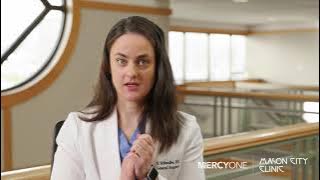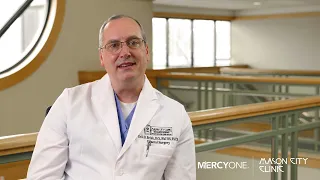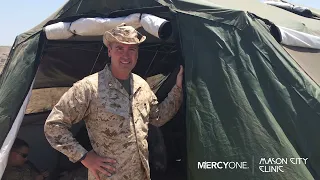Kathryn Schwalbe, DO:
I didn’t decide on general surgery until after I got into medical school, and I just thought it was the absolute most interesting thing ever that you could help somebody by fixing their anatomy and by altering their anatomy. So really, it’s multiple teams all working together with the same goal, and that goal is just patient care. It’s very simple. We just all want to do what’s best for our patients.
So the surgeries that we can offer our patients here in North Iowa is incredibly vast. We treat anything from breast cancer, colon cancer, infections of the colon, appendix, gallbladder. You can have more acute presentations where somebody has a hole in their colon or a hole in their stomach. We see a lot of patients with breast cancer that still has a quite significant amount of surgical intervention related to its cure of that disease process. So the role of the general surgeon, we’re the first doctor that a patient sees after they’ve had their diagnosis.
So we really set them up for success and we’re the first introduction to what their new normal is and what they can expect from things going forward. We also discuss all of our cases on a multidisciplinary tumor board. So we have radiology present, pathology present, the radiation oncologist, a medical oncologist, a bunch of the coordinators from the cancer center as well. So you can really make a team effort and a team decision to have the best possible cancer care here.
There are a lot of things that we do that previously would’ve had to do an open procedure, and now we can do them either laparoscopically or robotically with the tiny little scratches. The data out there is that compared to an open procedure, the laparoscopic procedures have less recovery time, less infection. Folks just feel better quicker, and they still have the same post-surgical outcomes. So even for our cancer care, we can take out a colon cancer laparoscopically and have the same oncologic cure rates that we would have for the open procedure. And even compared to laparoscopic procedures, the robotic procedures folks do even better. So that’s one of the big drivers for us having a strong robotics presence here in Mason City.
So I think that one of the most important aspects of the surgeon-patient relationship is trust, right? The patients, as soon as you go to sleep, you got to trust your surgeon to do what’s right for you. One of the nice things about Mason City is that we’re a small town, and so here, you’re not just a number, you’re a name, you are your own individual person, and I think that just makes the care here so much more personable.
 Dr. Schwalbe – Minimally Invasive Surgery
Dr. Schwalbe – Minimally Invasive Surgery
 Dr Brink talks about Pilonidal Cysts, also known as Jeep Driver Disease.
Dr Brink talks about Pilonidal Cysts, also known as Jeep Driver Disease.
 Dr. Brink discusses the positive outcomes of robotic and laparoscopic surgery
Dr. Brink discusses the positive outcomes of robotic and laparoscopic surgery